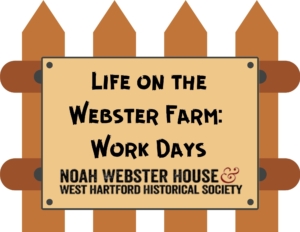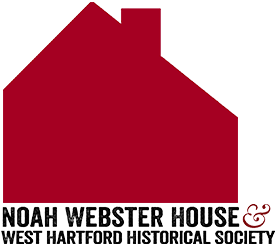Life on the Webster Farm: Work Days
Join us for Life on the Webster Farm: Work Days in 2025!
January 11, February 8, March 15, April 12, May 10, June 14, July 19, August 16, September 20, October 11, & November 29!
Visit the museum on select Saturdays from 1:00 p.m. – 4:00 p.m. and enjoy live demonstrations from our experienced team of museum educators. Each demonstration will focus on a unique aspect of early American work and play. Stop by and learn about the trades and activities of life on the Webster farm!
This program is included in museum admission. Enjoy FREE general admission for children 12 and under for this event!
See below for specific program offerings! For more information, please email events@noahwebsterhouse.org.
Thank you to our 2024-2025 Sponsor, the Rotary Club of West Hartford!
January 11, 2025 – From Sheep to Yarn
Where does yarn come from? What is it used for? Our museum teachers (in 18th-century period attire) will demonstrate how to spin sheep’s wool into yarn on our reproduction spinning wheels. Want to learn how? Try your hand at “carding” the wool, or finger-spinning and using the drop-spindle. Take home a sample of the wool …you’ve earned it!
February 8, 2025 – Noah’s Valentine
During the 18th century, Valentine’s Day became very popular, and it has only grown in popularity since. Come to the Noah Webster House to learn about Noah’s love life, read his love letters and then write your own letter to a loved one with authentic quill and ink, just like Noah himself!
March 15, 2025 – From Milk to Butter
We know milk comes from cows but how do we transform it into butter? Our museum teachers will demonstrate how butter was churned by hand on the Webster Farm in the 18th-century. If you’d like to pitch in, we are happy to show you how! Dairy samples will be available for tasting.
April 12, 2025 – Early American Games & Toys
While early Americans worked hard to fulfill household and farming responsibilities, they also found some time to have fun! Museum teachers will show your family how to play centuries-old games like “Jack Straws” and the “ball & cup”, the Jacob’s ladder, hand tops, or “button buzzers.” Make your own ball and cup to take home with you!
May 10, 2025 – Decorative Textiles
The making of textiles was mostly done out of necessity for clothing and other household goods. However, decorative needlework, knitting, crocheting, weaving and dyeing was an early American art form. Come see examples of textiles from our museum collection and use the same materials to make your own creation!
June 14, 2025 – From the Garden
Our museum teachers will lead you through a tour** of Webster’s east garden to explore how herbs were used for flavoring food, making medicine, fragrances and insecticides. Create a lavender sachet to take home with you… a relaxing and natural air freshener.
**weather permitting
July 19, 2025 – Early American Food Preservation
Today, we can easily buy anything we need year-round, but early Americans needed to preserve their food to last during the harsh winter months. Learn food preservation techniques, enjoy a sample of fresh jam made over our hearth and try your hand at making some quick pickles.
August 16, 2025 – The One Room Schoolhouse
Come and experience what school was like for Noah Webster and his classmates in the 1770s. Visitors will write with quill & ink, use slates to practice lessons, and read from Noah’s famous “Blue Back Speller” and horn books! Also, find out what games students would play at recess… come and find out!
September 20, 2025 – The Golden Age of Piracy
You may have speculated that famous pirates the likes of Captain Kidd and Blackbeard have visited Connecticut’s coastline, but did you know that our very own Noah Webster wrote a book on the dangers of piracy? Stop by to learn all about pirates, read from Noah’s book on piracy and even create your own pirate flag.
October 11, 2025 – The Importance of Corn
Corn, also known as maize, was a vital crop for Indigenous peoples and later the early American colonists. It helped to save the lives of many early Americans from starvation. Guests will learn about the history of corn, its importance across many cultures and timelines and make delicious corn-based treats common in the 18th century.
November 29, 2025 – Hearth Cooking
Try your hand at cooking meals over the open flame in our 18th-century reproduction fireplace! Our museum teachers will discuss how the Webster family prepared meals, where the ingredients came from… and tools that were used in cooking and baking.


